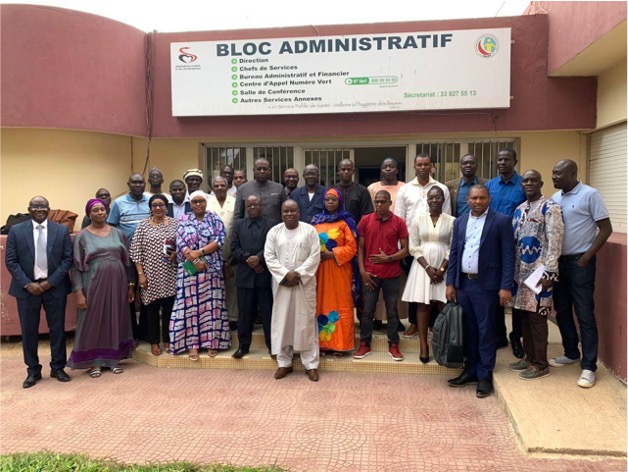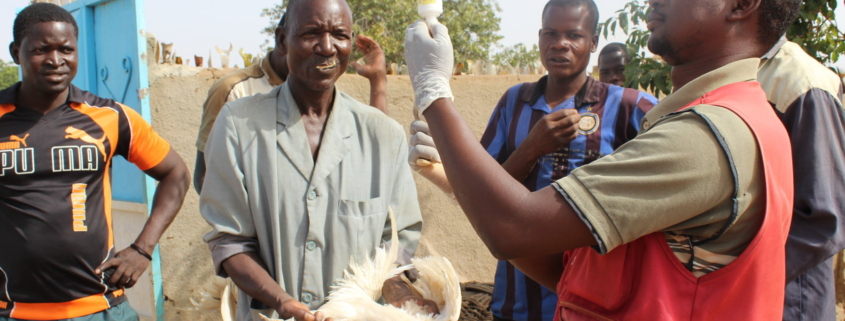Learning Together: Peer Learning Inspires Action to Improve One Health in Niger and Senegal
Imagine you were handed a piece of paper with a picture of a circle, the formula A = π r2 , and instructions to find the circle’s area. The task sounds simple enough unless you do not know what the symbols mean. Now imagine if you have a friend sitting next to you. She explains each symbol, uses a ruler to measure the value of r, and writes out the equation with the correct values for each symbol. Suddenly, this problem looks less daunting.
In 2018, Niger faced a similar situation. That year, the country, which is vulnerable to zoonotic disease outbreaks, established a One Health platform to facilitate multisectoral collaboration in preparing for and responding to outbreaks. However, coordination, leadership, and organizational, challenges prevented the platform from fully functioning. Niger needed a friend that had successfully navigated these types of challenges. Senegal proved to be just the friend Niger needed.
Learning From a Peer Platform
Since 2021, Breakthrough ACTION has been a steadfast partner in Niger’s effort to improve its capacity to conduct effective risk communication and community engagement (RCCE) activities during public health emergencies. Because a well-functioning One Health platform is the foundation for effective RCCE, Breakthrough ACTION and its partners in Niger explored the idea of peer-to-peer learning with successful One Health platforms.
In 2022, Niger’s One Health platform and Breakthrough ACTION identified Senegal, whose One Health platform is well-structured and highly functional, as the location for a study tour. Over four months, a planning committee with representatives from the governments of Niger and Senegal worked with key stakeholders to establish a common vision for the five-day study tour. Together, they also established clear objectives and expectations based on the unique needs and requests of each country’s One Health platform. Special care was taken to secure high-level buy-in and multisectoral stakeholder participation.
From May 22 to May 26, 2023, an 11-member delegation from Niger, representing various sectors and disciplines, visited three Senegalese national One Health structures: the Health Emergency Operations Center, National Health Education and Information Service, and Ministry of Livestock and Animal Production. Since outbreaks begin as local events, the delegation also visited the St. Louis Regional One Health Committee, St. Louis Mixed Outreach Coordination Unit, and the Guembeul Reserve, which was the site of an avian flu outbreak in 2022.

Niger’s delegation visiting Senegal’s Health Emergency Operations Center. Photo credit: Breakthrough ACTION
Because study tours are often packed with activities, the planning committee intentionally built in time for participants to reflect on their experiences after each site visit. Specifically, participants discussed common challenges related to decentralization and engaging One Health stakeholders at the local level.
In recognition of the fact that learners can also teach, the Niger delegation presented their country’s One Health experience alongside their Senegalese counterpart’s presentation.
This structured and collaborative approach enabled systemic knowledge exchange across many different operational areas of a One Health platform and inspired both countries to implement changes to strengthen their respective One Health platforms.
Transforming Knowledge and Inspiration into Action
Niger has since developed and validated a national One Health action plan (2023–2026) and eight regional One Health action plans. Recognizing the importance of a functional One Health Secretariat, following the tour, the government requested Breakthrough ACTION’s support in acquiring materials needed for their day-to-day operations. The members of the Secretariat are now working together to officially establish the various One Health coordination structures and thematic working groups and to revise the planned structure of the One Health committees at the regional level, which at the time of the study tour had not yet been installed.
Senegal likewise initiated changes. It modernized its 2019 One Health decree, making it more responsive to new challenges. Inspired by Niger’s streamlined approach, Senegal initiated discussions to reduce their large number of technical working groups. With fewer working groups, members have become more engaged and are now well positioned to address new One Health challenges. Additionally, the study tour catalyzed the launch of an integrated planning process for regional One Health platforms, ensuring a cohesive and comprehensive strategy across different regions.
Promoting Peer Learning to Improve Health Outcomes
Niger’s and Senegal’s shared journey is proof that peer learning works. A new case study by Breakthrough ACTION highlights the elements of successful peer learning and provides valuable guidance for those who want to implement peer-learning activities.
Written by: Meei Child, Communications Officer, Breakthrough ACTION


